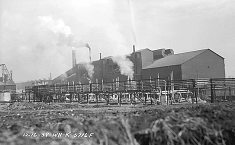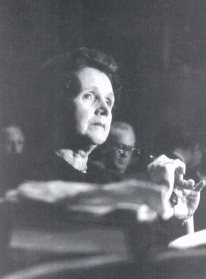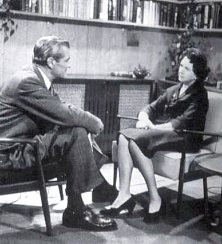Rachel Carson and the Awakening of Environmental Consciousness
Linda Lear, George Washington University
©Linda Lear ©National Humanities Center
|
|
(part 3 of 6)
 |
|
 |
Agrichemical plant
1938
| National Archives
|
|
 |
The trail of the pollution of the environment indicated that big business, in this case the agricultural chemical industry,
had made alliances with government to use its products when research was incomplete. In its rush for profits and control
of markets, industry scientists did not always put the public's health or the future of the environment first. Carson insisted
that human beings were not in control of nature, but a part of nature: the survival of one depended upon the survival of
all.
The multi-million dollar industrial chemical industry was not about to let a former government editor without a Ph.D. and no institutional authority undermine public confidence in its products or question its integrity. At first they treated Carson as a minor public relations problem, but when Congress began to investigate Carson's charges and President John F.
Kennedy signaled his interest, industry and the scientific establishment attacked Carson's credibility, and mocked her
concerns. They attacked her as an alarmist who did not know enough science. She was simply an hysterical woman who
had an overly romantic attachment to nature. Silent Spring had reached millions of readers. But when CBS aired an
hour-long television special in the summer of 1963 exploring the pesticide controversy, Carson's case against the misuse of chemical pesticides gained new credibility. There the public saw a calm and objective Carson concerned about the welfare
of the human and natural environment opposed by a string of government scientists and officials who admitted their
ignorance of the consequences of using these toxic chemicals while industry scientists dramatically predicted plague and
famine without them. Even Americans who had never read Silent Spring became concerned about the pollution of the environment.
Lear/Carson Archive  |
Carson testifying before a U.S. Senate subcommittee, 1963
|
"a
compelling example of the power of the single individual to bring about change"
|
|
|
|
 |
Before she died, Carson testified before several U. S. Senate Committees. Among other measures, she called for the
creation of a new, independent government regulatory agency to monitor human and environmental health. Although she
did not live to see the legislation establishing the Environmental Protection Agency enacted, Carson realized that others who shared her concern with the health and well being of all life would carry on her work. Carson had gambled that once
informed, the American public would demand the right to know what was being done to the planet in the name of
technological progress. In the face of personal attack, and in spite of being gravely ill, Rachel Carson provided a
compelling example of the power of the single individual to bring about change. By her insistence that we adopt a posture
of humility rather than arrogance when dealing with the natural world, she helped to generate a new environmental
consciousness that gave rise to the contemporary environmental movement.
TeacherServe Home Page
National Humanities Center
7 Alexander Drive, P.O. Box 12256
Research Triangle Park, North Carolina 27709
Phone: (919) 549-0661 Fax: (919) 990-8535
Revised: June 2002
nationalhumanitiescenter.org |




